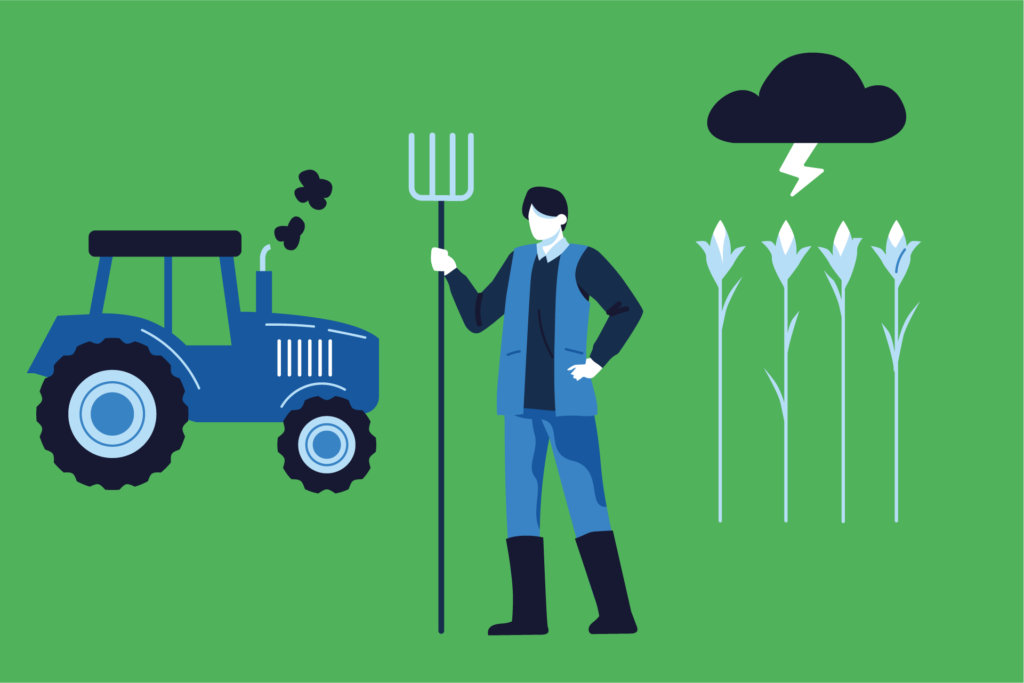Our goal at Lending Valley is to provide all small business owners access to the best loans possible for their business. You can rest assured we will get you the best rates in the market!

All businesses are run with a certain level of risk, but the farming industry, in particular, is subject to a lot of uncertainty. That’s where farm financing comes in which allows farmers to sustain their business and take it to the next level. Aside from that, on top of the regular risks of a typical business, farmers are forced to deal with make or break factors every year that are essentially out of their control.
For example, an entire year’s crop could be lost due to a bad turn of weather; or an essential piece of equipment costing tens of thousands of dollars could unexpectedly break down.
Farm profits rely heavily on the seasons and can fluctuate massively from one year to the next.
Farmers of both livestock and produce are also at the mercy of the food markets. If the cost of beef or carrots goes down by 40%, it’s the farms that suffer the most.
Capital requirements.
If you look at the majority of farm business models, you will see that most rely heavily on flexible access to credit. While farmers might have a lot of net worth, due to the amount of collateral that they have in terms of land, equipment, stock, etc. Most of their money is tied up in these assets, making it difficult to get by when cash flow is at its lowest.
Farming by nature is seasonal, and there are not many industries within farming that offer a constant and consistent income, which is why so many require financing on a regular basis.
Farmers need capital to buy/pay for stock, seeds, staff, equipment, fertilizers, and so on, which will eventually be used to turn them a profit. When they sell what they have farmed, the profit is used to pay back the loan, and then the rest is used to live off.
Farming by finance is a popular business model that allows farmers to easily adjust to current food markets.
There might be more people on this planet with every year that passes, but the farming industry is seeing the complete opposite of an increase in sales.
Average farm income has halved since 2013 and doesn’t look to be on the rise any time soon, which is very worrying for both farms and lenders.
The reason why the farming industry is in decline is not because of a lack of food demand, but instead an increase. The rise of the population has seen an influx of ‘super farms’ that completely dwarf the average holding in the united states. These super farms can grow more food for cheaper, resulting in the smaller guys not being able to compete on price.
As the profitability of the smaller farms decreases, so does their ability to pay back credit and in turn, their credit score/ loan eligibility.
Traditional lenders are becoming more and more reluctant to offer loans to farmers unless they can demonstrate consistent profits, and/or put up substantial amounts of collateral.

One of the most popular bad credit financing options is short term business loans. Short term loans, as the name suggests, are taken over a short period of time, usually between 3 and 12 months. The loan amount depends greatly on the needs of the business, as well as:
Interest rates also vary greatly lender to lender, but you can usually expect to pay between 5% – 10% interest on the initial amount borrowed. Those who have bad credit might see an increase in this percentage, although, businesses with bad credit stand a good chance of being able to secure a short term loan.
When deciding to take out a business loan, there are a few important considerations that you have to take into account before committing to an application:
Short term loans cover many financing options that are paid back usually within 12 months. Here is a brief overview of your options:
Term loans: Term loans are your most basic forms of borrowing, and they work for your business exactly the same as how a personal loan would. Term loans involve An amount borrowed, followed by arranged monthly repayments at a set rate with fixed interest terms.
Invoice financing: Invoice financing is perfect for businesses that are having cash flow problems, but have guaranteed money due in the near future. Invoice factoring works by the lender paying the business a percentage of the money due to them, then when the money is collected the lender takes back the amount, plus their percentage fee.
Asset financing: Asset financing works by borrowing money to buy business-related equipment only, this could range from stationary to machinery. Then over a set period of time, the money is paid back with interest. Asset financing can sometimes offer very good interest rates and many companies offer 0% grace periods as well to encourage sales.
Business lines of credit: Business line of credit is best explained as a credit card that can be used for business purposes only. Line of credit offers borrowers a fixed balance that they can use for expenses and cash flow troubles. Repayments of business lines of credit are usually subject to high-interest rates, and it is not uncommon to find variable rates depending on how long it takes you to pay the money back.
Applying for a farm loan with bad credit works in much the same way as any business, although due to the bad credit, there are a few ways that you can increase your eligibility and receive better terms/rates.

One of the best ways that you can secure a farm loan with bad credit is to use compensating factors that work in your favor. Lenders like to look at the big picture when deciding on who is eligible for what. For example, you might have a bad credit score, but being able to demonstrate a low debt ratio, and having 10+ years of profitable trading in the farming industry might be able to offset the risk of said low score.
Lenders are ultimately looking for an idea of your overall risk, not just a single specific thing. When approaching a lender, it is best to be able to present one of the following:
While all lenders are going to look at these compensating factors differently, being able to present a trustworthy business profile is key to securing a loan with good rates and terms.
It is also important to shop around when looking for a loan as well. One lender might not see your compensating factors as valid, while others might. Shopping around and getting multiple quotes is key to getting the best rates and terms.
Having poor credit should not deter you from searching out financing. As mentioned above, there are many other factors that lenders will take into account when determining your eligibility.
If you are on the fence about whether or not farm financing is for you, here a just a few ways that additional funds can help you to recover from a bump in the road, or allow you to expand your business indefinitely.
New machinery and equipment: As anybody who has been close to a farm knows, agriculture requires a lot of machinery and equipment; none of which runs cheap. Updating your tractor, harvester, fencing or even your workforce can make operations move more efficiently and result in more profits. A loan such as a business line of credit can also be held in case of equipment failure.
Upgrading Your Systems: Pennies saved can equal thousands made. Upgrading agriculture systems such as your field irrigation can cost a lot upfront, but the long term savings can make your business more profitable once the loan has been paid.
Adding to your offering: In the unsettling ups and downs of the food market, it has never been more important to show diversity in your offering. By adding an extra crop or livestock, you widen both your safety net and money-making potential.
Hiring Farmers During a Cash Crunch: When a farm goes through a tough time with financials, it is usually the workforce that sees the cuts first. While staffing can be a big expense, losing staff can make it difficult to ever get out of a rut, and if you do you will have nobody in place to aid in the regained work.
A farm loan can help to cover wages while the farm gets back on its feet or reaches the awaited harvest date.
Most bad credit lenders fall into one of the main 2 categories: Traditional lenders and alternative lenders.
Traditional Lenders: While traditional lenders will offer farms with poor credit financing solutions, their standards are very high, and it is not easy to qualify. To secure a loan with a traditional lender you will usually have to demonstrate years of profit/loss accounts, have valuable assets that you can put up against the loan, and have a credit score that is improving. The application process of traditional lenders can also take several weeks, which is time most people simply don’t have.
The main benefit of working with traditional lenders is that if you do qualify you will likely have the opportunity to ‘upgrade’ your loan from a short term, to a long term.
Alternative Lenders: Alternative lenders, such as Lending valley, make the farm financing process easy and quick. Using alternative lenders when you have bad credit gives you the highest chances of been accepted, while also being subject to fair terms.
Using Lending valley as an example:
You can apply for a range of financing products, including short term loans, business lines of credit, and invoice factoring, etc. As long as you can provide the relevant information. On acceptance, you can usually expect to see the money in your account within a few days, sometimes within 24 hours.
The interest rates that you receive will vary greatly on your business profile, but while you can expect them to be slightly higher than traditional lenders, your chances of acceptance are much higher.
Alternative lenders such as Lending valley are a fantastic option for farm businesses with bad credit looking to reap the benefits of business financing.